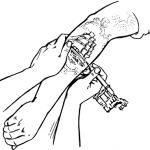Cén Cineál Loinge Atá sa Tatú? Posted by róislín on Feb 20, 2012 in Irish Language
(le Róislín)
Ceist amháin eile faoin tatú seo. Maidir le longa, an bhfuil a fhios ag duine ar bith cén sórt loinge í seo? An t-ainm i nGaeilge, nó i mBéarla, is cuma.
But before we get further into types of ships, let’s look at the basic word for “ship” in Irish (as opposed to “bád,” a boat).
an long, the ship
loinge, of (a) ship (dialann loinge, ship’s logbook; or, if you like a longer grammatically more complex challenge: tionscadal mhacasamhail na loinge ón nGorta Mór, replica famine-ship project)
na loinge, of the ship (Glaoigh ar chomplacht na loinge! Call the ship’s hands!, lit. the ship’s company)
longa, ships (longa arda, tall ships)
long, of ships (tógálaí long, ship builder, lit. builder of ships)
na long, of the ships (Tiobóid na Long, Tiobóid/Tibbot of the Ships, nickname of Theobald Bourke, who was born at sea in 1567, the son of Grace O’Malley, the “pirate queen”)
Of course there’s also “bád loinge” (a ship’s boat)! And one more homonym alert! As you might expect, there is another family of words in Irish with the same spelling. This word family includes: “long” (cavity, gullet, swallow-hole in bog), “longadh” (to swallow, to consume), and “longach” (gluttonous, or “quaking” as in a “quaking bog”).
Meanwhile, as for cineálacha long, here are a few, with a few cineálacha bád mixed in as well:
bád farantóireachta, a ferry
clipéar, a clipper
húicéir, a hooker
long cheannaigh, a merchant ship (aka long thrádála)
long fhada, a longship or galley
long ghlanta doirtí ola, a depolluting ship
long Lochlannach, a Viking ship
long foghlaithe, a pirate ship
púcán, a fishing smack
scif (pl: scifeanna), a skiff
tramp, (pl: trampanna, in case you’re wondering) tramp, tramp steamer
and the smallest of all that I know of, curach aonair (na cinn atá in úsáid sa Bhreatain Bheag, ní sa bhfarraige ach sna haibhneacha, iad gann anois, ach ann; iad cruinn, ní i gcruth naomhóige). Curachín Reepicheep an ceann is lú riamh, is dócha.
Anyway, here’s what my fairly non-nautical self thinks about the ship in the tattoo. But, as you can see, I scrambled up the letters. So when you’ve got it unscrambled, please do write in and let us know if this is the correct type of boat. And if not, cén sórt loinge í?
Nítcrábini
My limited seafaring knowledge suggests that this ship doesn’t actually have a seol jibe (jib sail), since na seolta jibe are triantánach, nach bhfuil? But to use the phrase go fíortha, what can you tell from the cut of her jib? An méid den “jib” is féidir linn a fheiceáil ón tatú, ar a laghad. SGF, Róislín
Gluais: aonair, (for/of) one person; ar a laghad, at least; cruth, shape; gann, scarce; is lú, smallest; naomhóg, used for the more pointed/oblongish-shaped curach typical in Ireland, and also more recently used for canoe, although that seems to me to be misleading; riamh, ever; tionscadal, project; triantánach, triangular
Freagra: báircintín. An é sin an cineál loinge atá ann? Tá sin le freagairt fós!

Build vocabulary, practice pronunciation, and more with Transparent Language Online. Available anytime, anywhere, on any device.





Leave a comment: